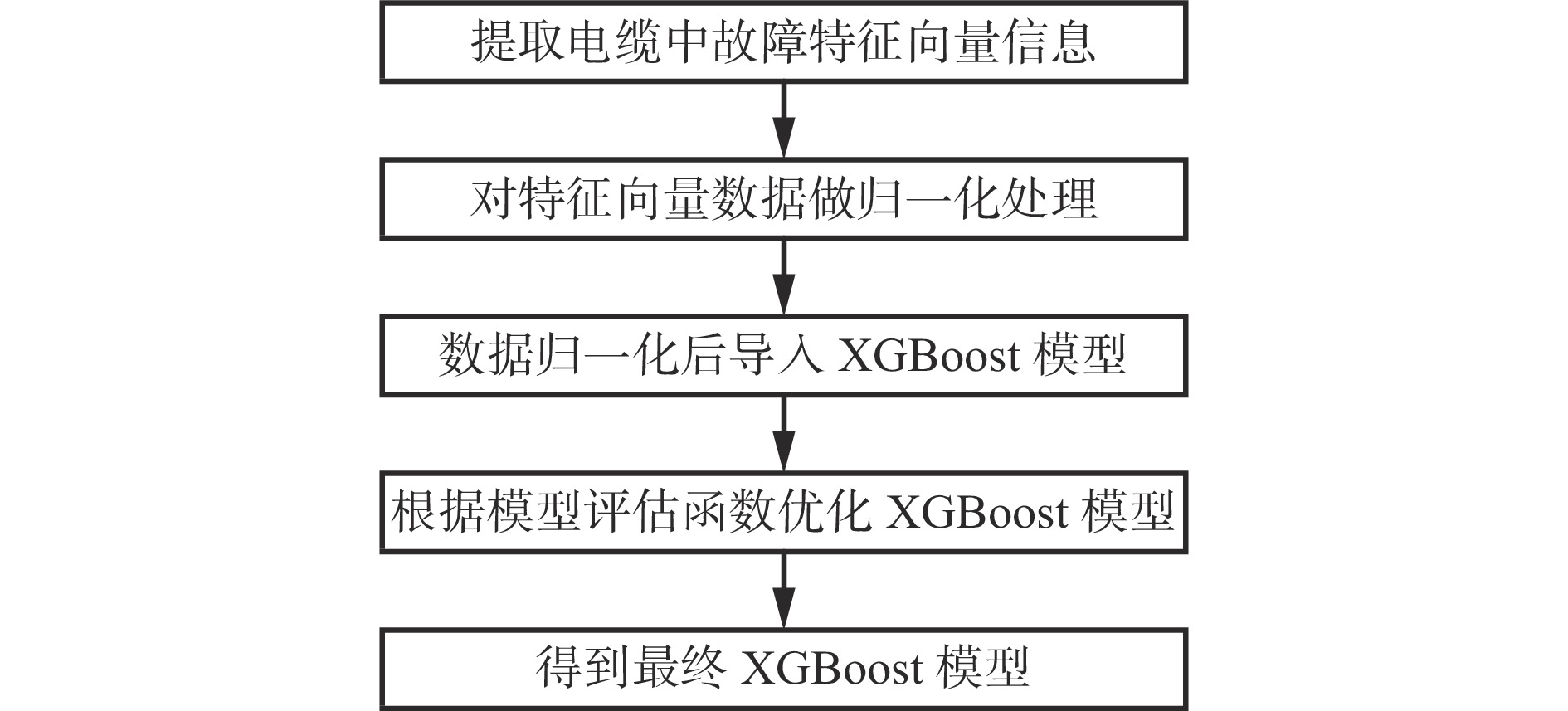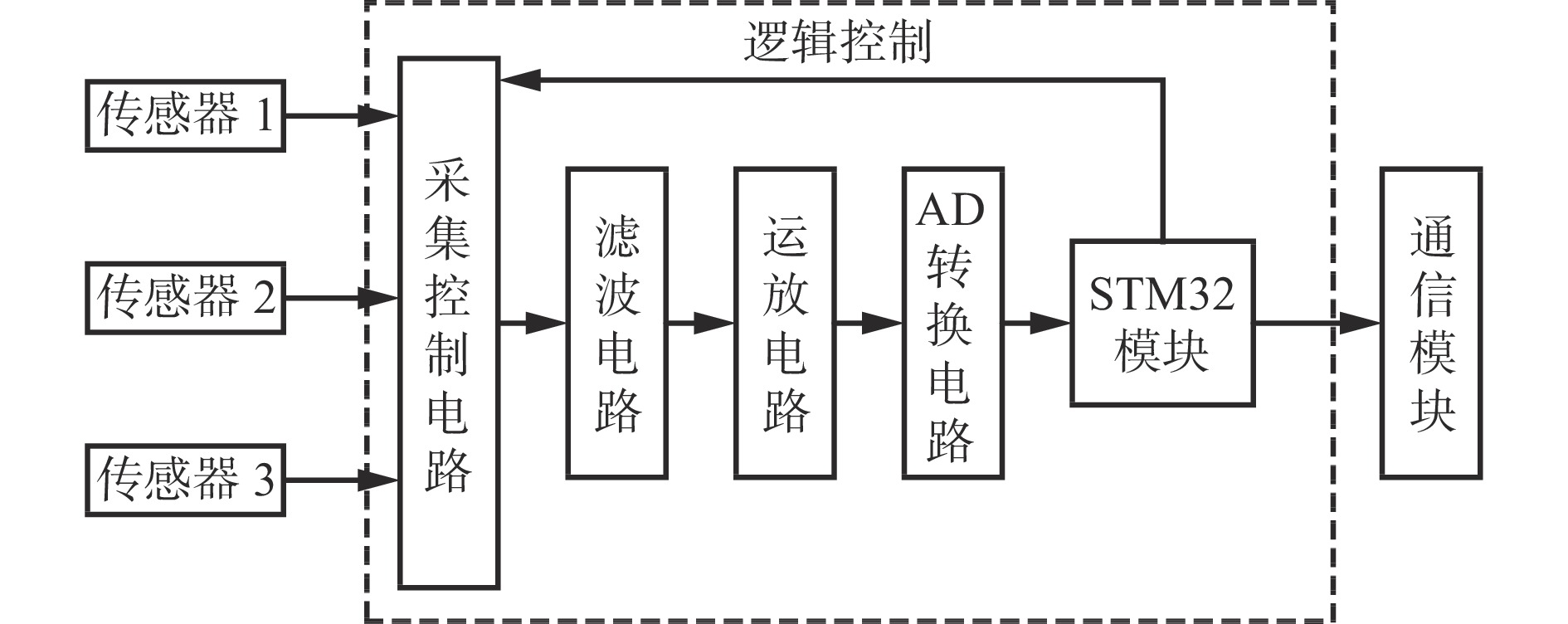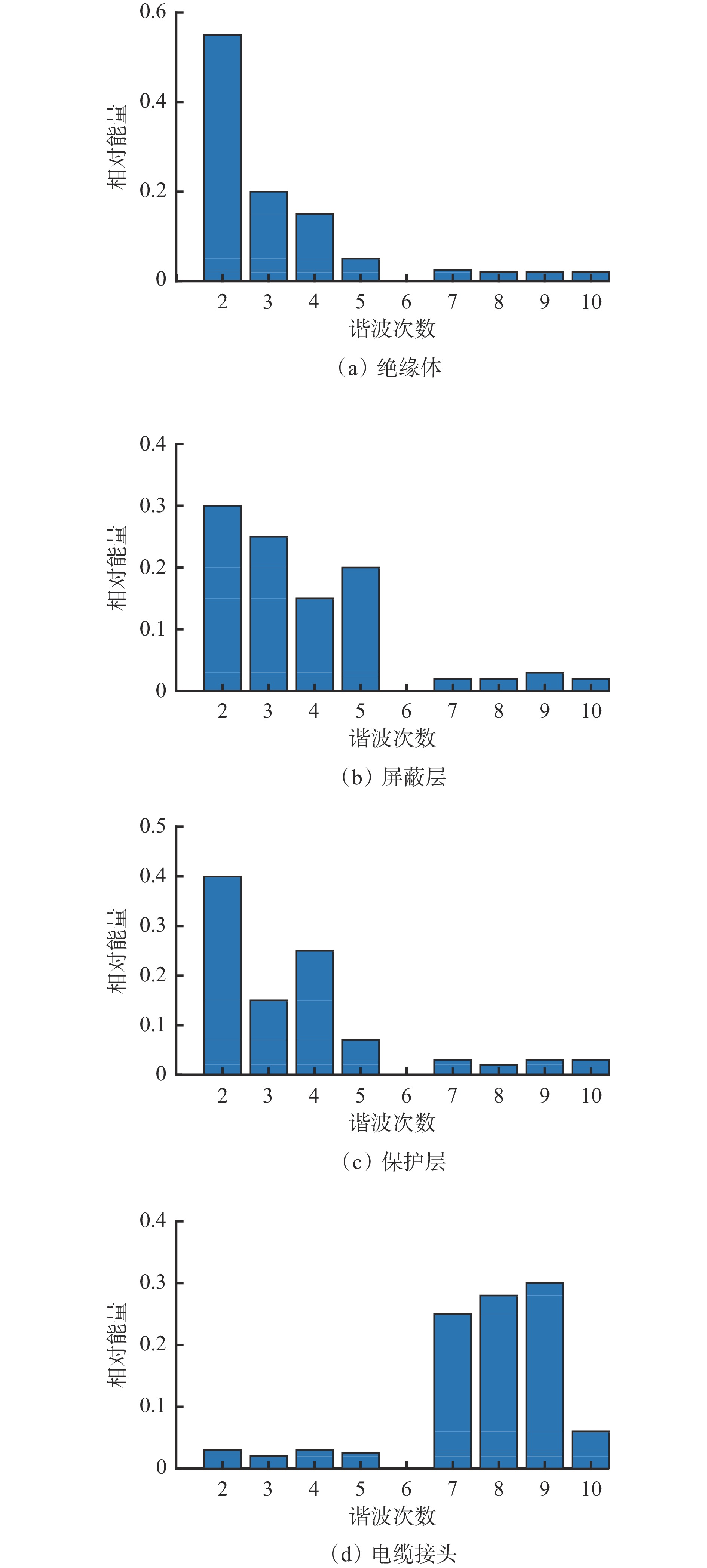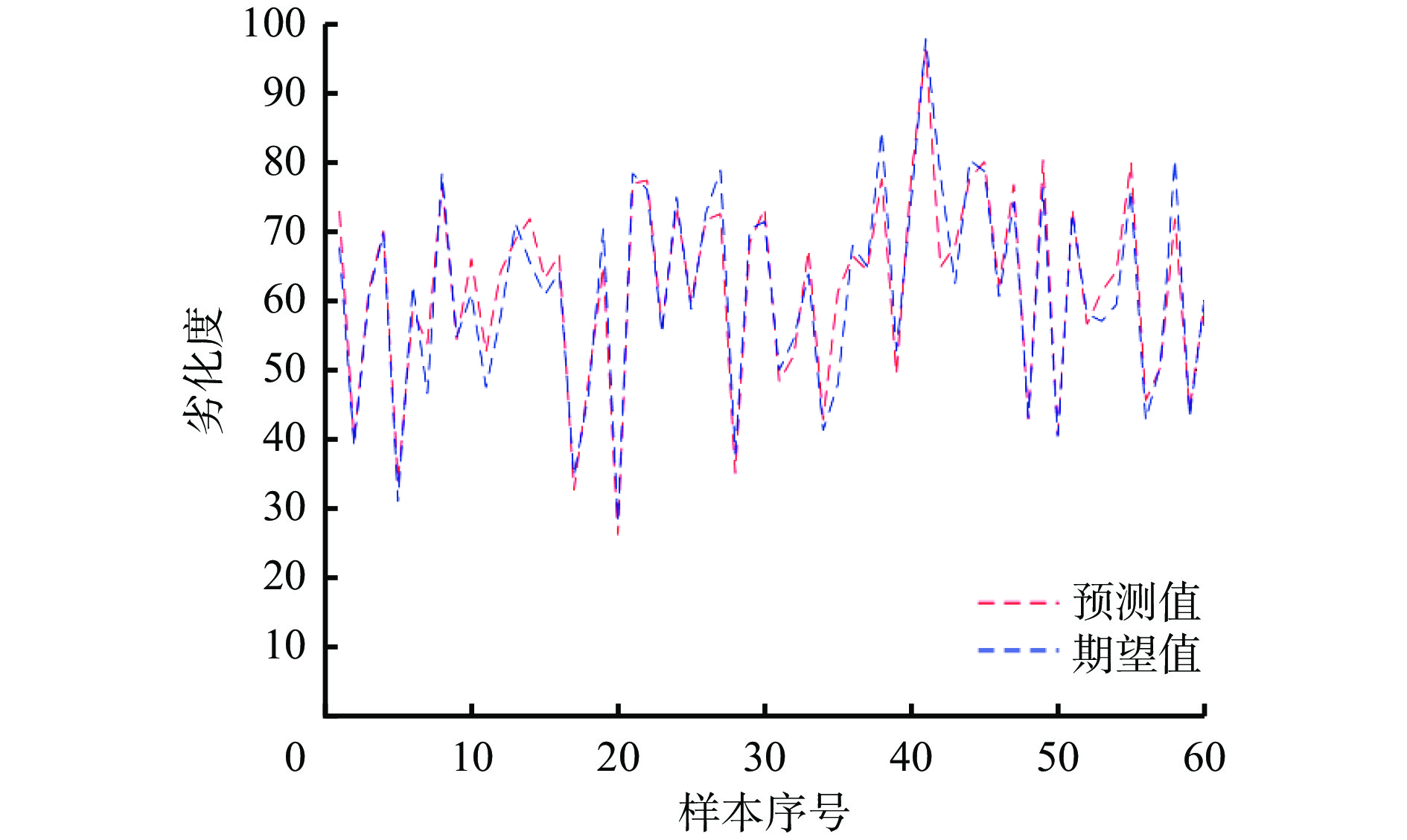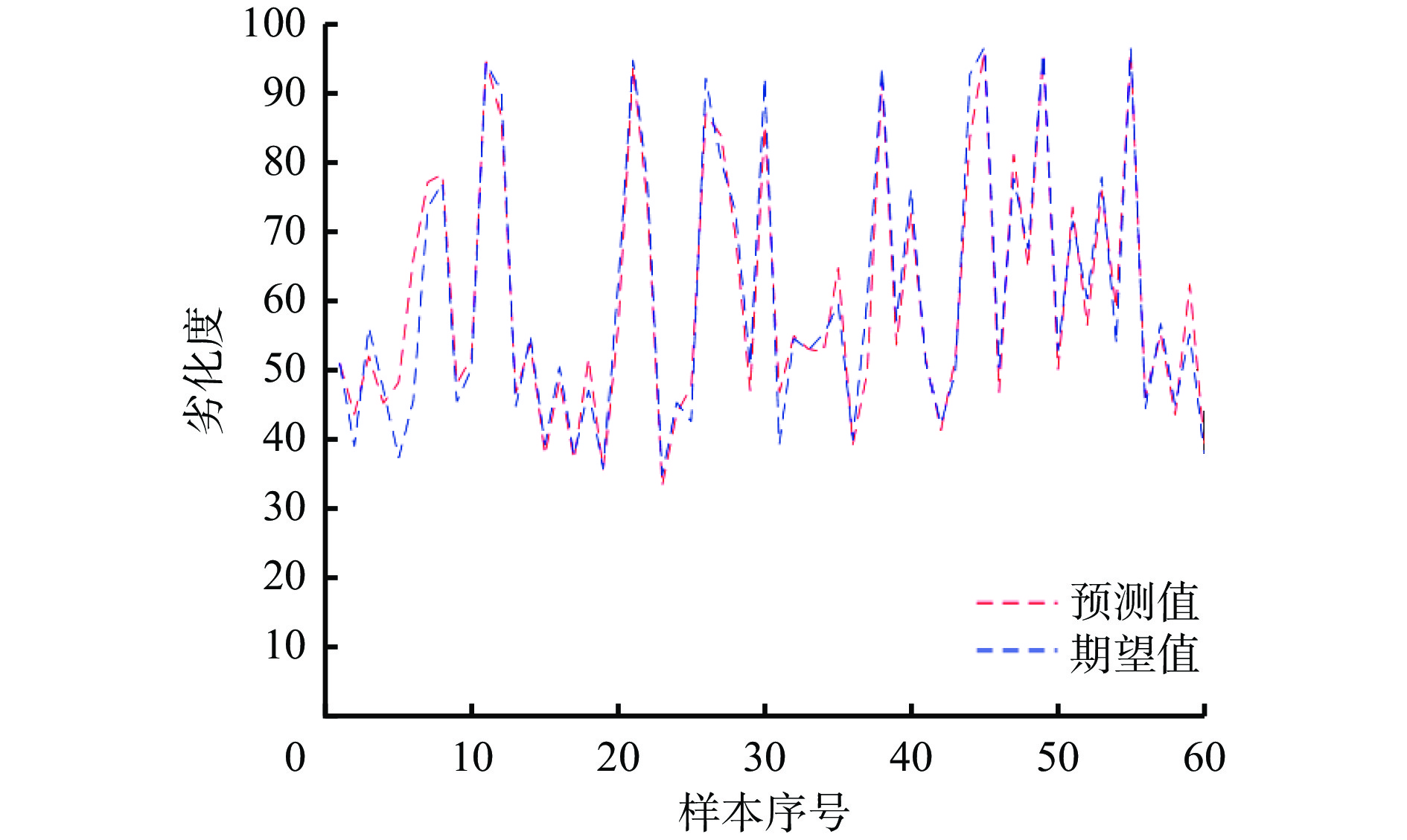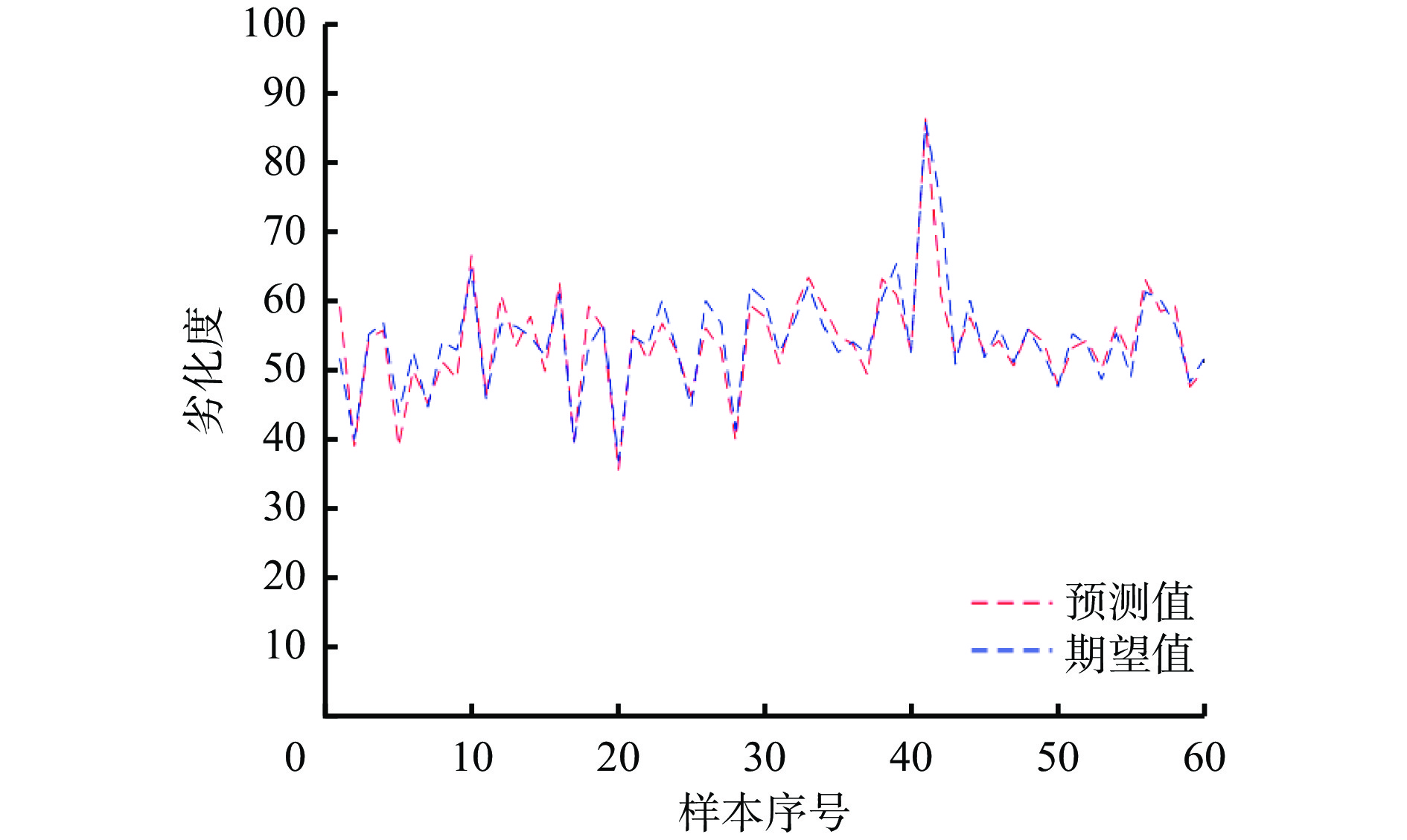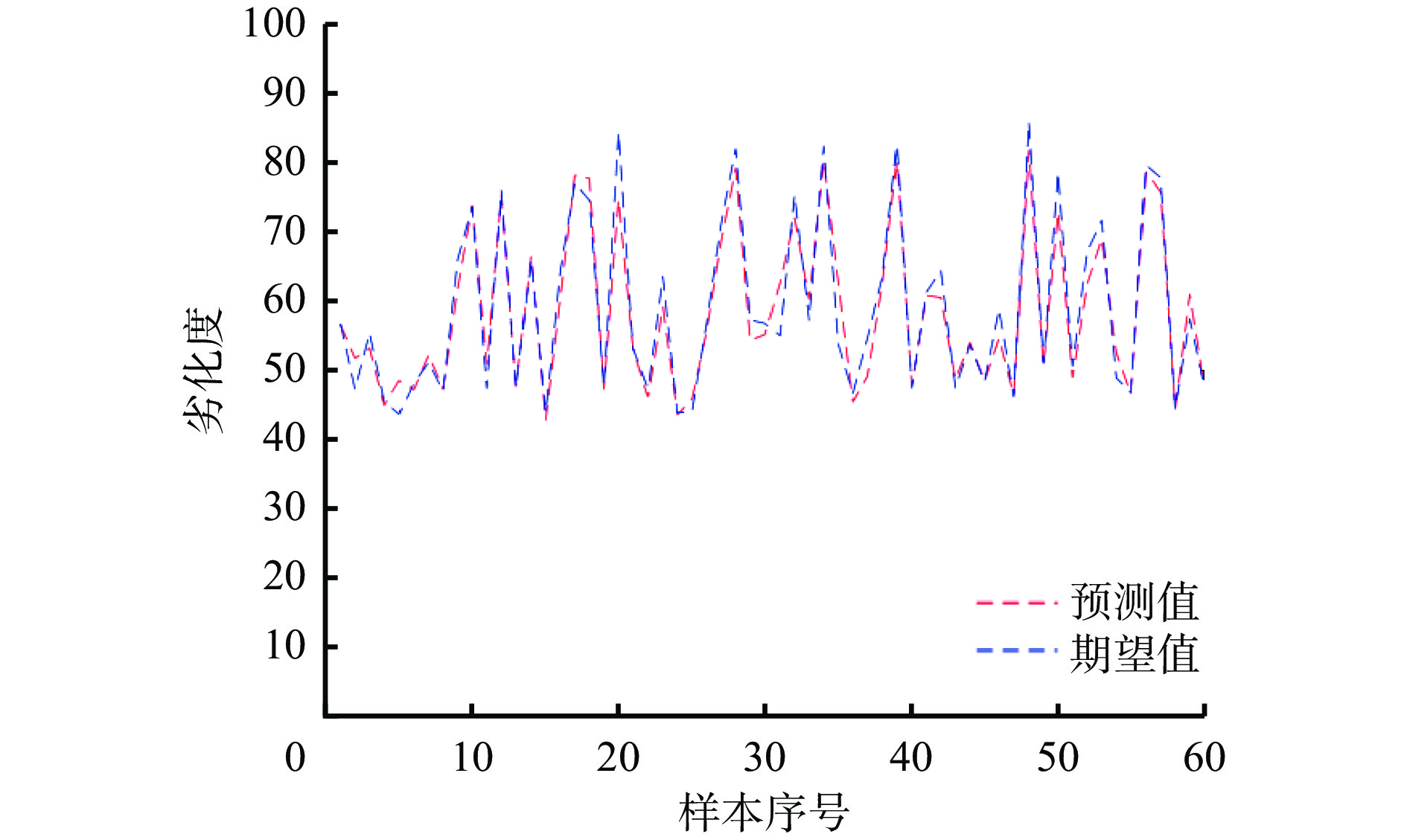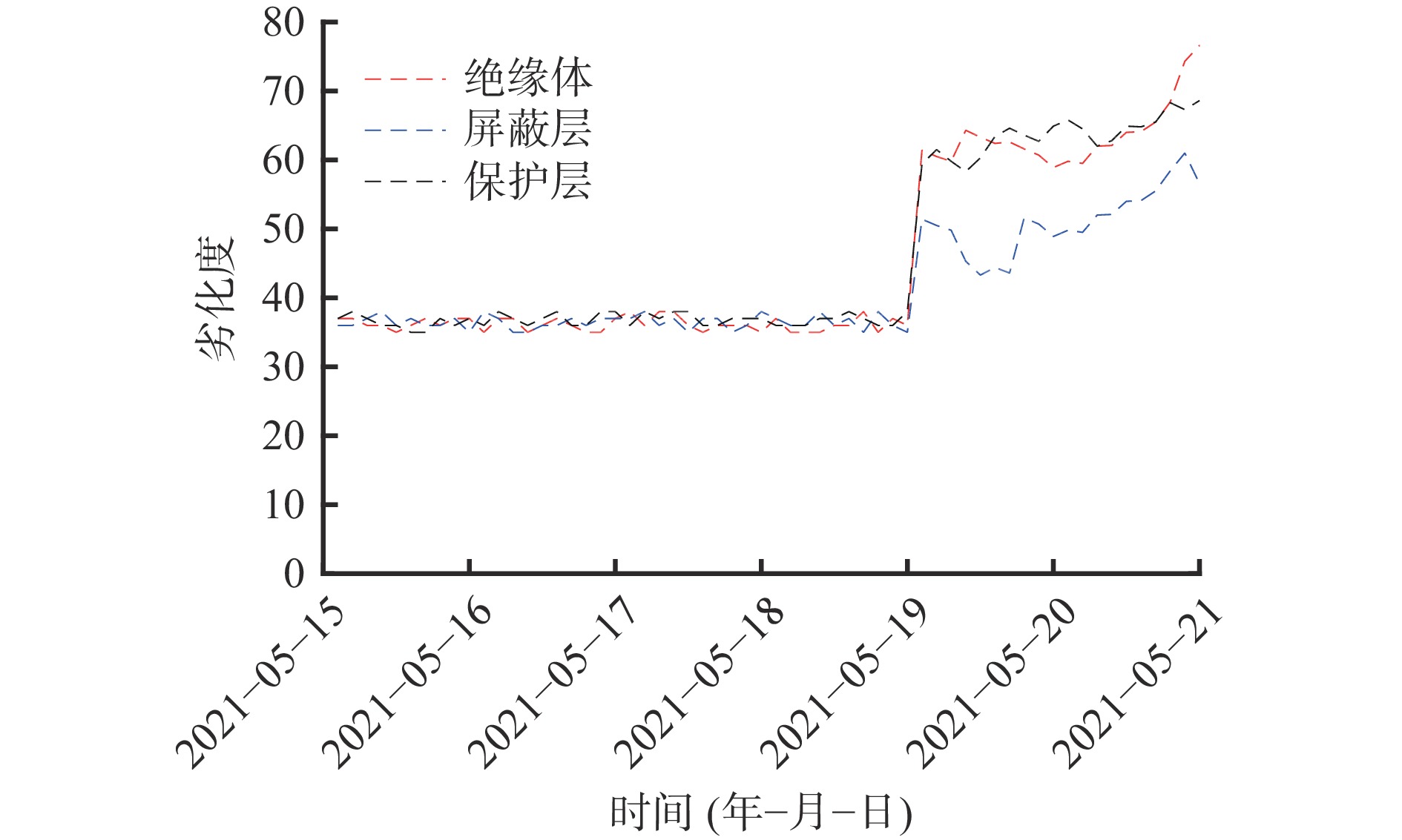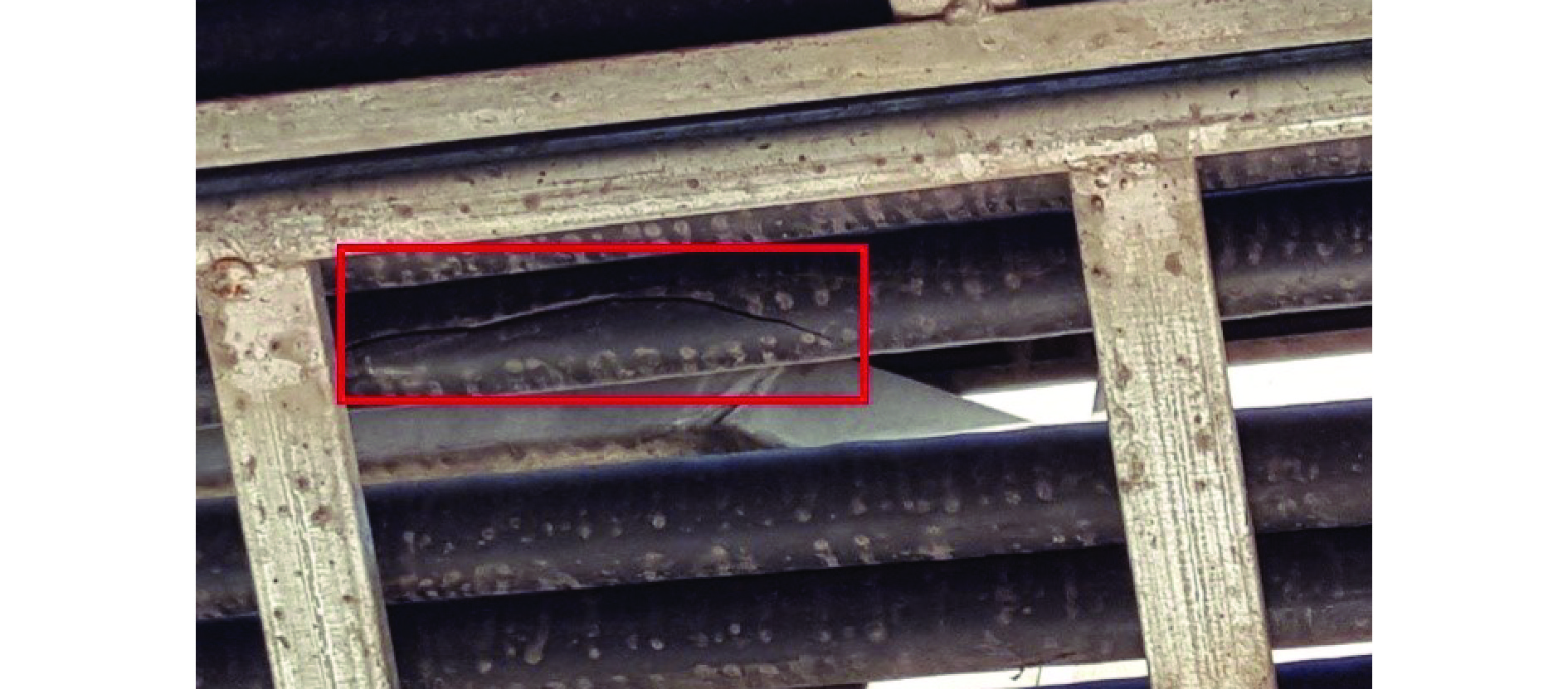Degradation monitoring and fault diagnosis of mining cables based on current harmonic features
-
摘要: 矿用电缆受煤矿恶劣环境影响,容易发生绝缘劣化、护套受损等情况,传统的矿用电缆检测多采用低压脉冲法、局放法等离线诊断方式,操作复杂,准确度低,难以满足现代煤矿生产需求。而现有基于谐波的电缆故障诊断方法存在检测装置笨重、检测精确低、难以在煤矿应用等问题。针对上述问题,提出一种基于电流谐波特征的矿用电缆劣化监测与故障诊断方法。提取电缆中高次谐波含量信息作为故障特征向量,对特征向量进行归一化处理后导入极限梯度提升树(XGBoost)模型,结合已知电缆故障劣化度数据,形成训练样本集,训练XGBoost模型,最后通过构建的XGBoost模型对电缆劣化度进行实时监测和故障诊断。仿真结果表明:针对电缆不同部位提取的高次谐波向量的相对能量有明显不同,表明提取的高次谐波向量可表征电缆不同部位的运行状态;XGBoost模型的拟合优度参数R2高达 0.93,且误差较小。案例分析结果验证了基于电流谐波特征的矿用电缆劣化监测与故障诊断方法可对矿用电缆运行状态及劣化故障进行实时、准确的监测和诊断。Abstract: Mining cables are affected by the harsh environment of coal mines, and are prone to insulation degradation and sheath damage. The traditional offline diagnostic methods such as low-voltage pulse method and partial discharge method are often used for detecting mining cables. The methods are complex to operate and have low accuracy, making it difficult to meet the needs of modern coal mine production. However, the existing harmonic based cable fault diagnosis methods have problems such as bulky detection devices, low detection precision, and difficulty in application in coal mines. In order to solve the above problems, a degradation monitoring and diagnosing method of mining cables based on current harmonic features is proposed. The method extracts high-order harmonic content information in cables as fault feature vectors, normalize the feature vectors, and then import them into extreme gradient boost tree (XGBoost) model. Combined with known cable fault degradation value data, a training sample set is formed to train the XGBoost model. Finally, the method uses the constructed XGBoost model to monitor and diagnose cable degradation in real-time. The simulation results show that the relative energy of the extracted high-order harmonic vectors from different parts of the cable is significantly different. The extracted high-order harmonic vectors can characterize the operating status of different parts of the cable. The goodness of fit parameter R2 of the XGBoost model is as high as 0.93, and the error is small. The case analysis results verify that the degradation monitoring and fault diagnosis method of mining cables based on current harmonic features can provide real-time and accurate monitoring and diagnosis of the operation status and degradation faults of mining cables.
-
0. 引言
随着煤矿智能化的快速发展,电缆在煤矿供电中的应用越来越广泛。但由于煤矿环境恶劣,电缆在运行过程中极易受到热应力、机械应力、电压应力等各种因素的影响,使电缆绝缘、护套等发生损坏,产生局部过热和漏电现象,不但会影响煤矿的正常开采工作,严重时还会引发火灾等安全事故。据统计,电缆故障造成的煤矿事故占比超过50%[1]。因此,准确检测矿用电缆的运行状态并及时排查安全隐患成为煤矿领域亟待解决的问题[2-4]。
目前,矿用电缆状态监测和故障诊断方法主要包括低压脉冲法、局放法、低频电流叠加法、直流分量法和直流叠加法等[5-9]。这些方法虽然对特定故障具有良好的诊断效果,但无法全面评估电缆各个部位的劣化状态,更无法对电缆的劣化和故障趋势进行预测。此外,这些诊断方法需要电缆停止运行后才能进行检测,严重影响煤矿的正常生产。
20世纪20年代,有研究人员发现电气设备发生故障时会产生相应的谐波,催生了电气设备的谐波诊断技术[10-11]。近年来的研究发现电缆在受到热、电压、环境和机械应力时,会导致电缆介质磁束变化和介质振动,从而产生高次谐波,因此众多学者开始研究电缆的谐波诊断技术。文献[12]通过有限元法对电缆缺陷状态下电场和磁场的变化进行了仿真研究。文献[13]提出了一种基于损耗电流谐波的车载式电缆检测系统,该系统具有诊断速度快、准确性高的优点,但系统设备较为笨重,操作复杂,无法应用于狭窄的煤矿环境中。文献[14-16]提出了一种通过电流互感器采集谐波信号的诊断系统,通过Matlab编写的快速傅里叶变换(Fast Fourier Transform,FFT)程序对数据进行处理,得到谐波分量数据,该系统在测试中需要人工手动调节电桥平衡,工作效率低。文献[17]研制了一种测试装置并用于现场测试,该装置可通过连续检测形成电缆动态变化趋势,但检测精度有待进一步提高。
针对现有电缆诊断系统存在的装置笨重、检测精确低、难以在煤矿应用的问题,提出一种基于电流谐波特征的矿用电缆劣化监测与故障诊断方法。首先,在线采集运行中的电缆谐波数据并进行小波变换处理,得到电缆中高次谐波的含量;然后,利用电缆故障特征向量对极限梯度提升树(XGBoost)模型进行训练;最后,通过构建的XGBoost模型对电缆劣化度进行实时监测和故障诊断。
1. 电缆谐波诊断技术原理
电缆运行过程中发生劣化后,其介质内部的磁偶极子会相应地发生改变,使得磁矩取向在电缆线芯电流磁场作用下重新排列,这种重新排列会在电流的高次谐波成分中体现出来。电缆异常状态下,介质内部磁束变化引起的涡电流是导致电缆电流中产生奇次谐波的主要原因,而机械振动等引起的涡电流是导致电缆电流中产生偶次谐波的主要原因,涡电流导致电缆发生局部过热现象,从而使电缆不同部位出现老化现象。谐波诊断技术根据上述原理对电流中的高次谐波成分进行分析,从而实现电缆运行状态监测和故障诊断[18]。电力电缆中的磁场Φ与电流I如图1所示。
2. XGBoost模型构建
2.1 XGBoost原理
XGBoost是一种使用提升框架合并模型的集成学习技术[19],其基础是梯度提升决策树(Gradient Boosting Decision Tree,GBDT)。与GBDT相比,XGBoost在目标函数上使用了2阶泰勒展开,可以保留更多的目标信息,提高了模型的准确性。对比其他回归预测模型,XGBoost模型在面对大量输入数据进行训练时,用时短,推理效率高,可以满足电缆故障实时诊断需求。
遵循集成方法,XGBoost利用加法模型和前向分布算法,构建了一个具有多个分类和回归树(Classification and Regression Tree,CART)的集成树模型。对决策树进行评估,并选择最佳的决策树来预测目标值[20]。
设XGBoost由K个基模型组成,则有
Yi=K∑k=1fk(di) (1) 式中:Yi为第i个样本的预测值;fk为第k个基模型;di为第i个样本的故障特征。
XGBoost的损失函数为
L=n∑i=1l(yi,Yi) (2) 式中:n为样本总数;l为样本损失函数;yi为第 i个样本的真实值。
XGBoost的目标函数为
O=L+K∑k=1Ω(fk) (3) 式中:Ω(fk)为正则项。
Ω(fk)=γQ+12λQ∑j=1ω2j (4) 式中:γ和λ为惩罚项;Q为决策树叶子的节点数目;ωj为节点j的权重。
2.2 XGBoost模型构建步骤
构建XGBoost模型[21],并对其进行训练和参数优化,构建流程如图2所示。
1) 提取电缆中的高次谐波含量信息,即故障特征向量信息。
2) 对特征向量数据进行归一化处理。
x\left( {a,b} \right) = {\boldsymbol{X}}\left( {a,b} \right)/{\left| {\boldsymbol{X}}\left( {a,b} \right) \right|_{\max }} (5) 式中: x\left( {a,b} \right) 为归一化后的电缆高次谐波向量离散时间序列,a为谐波次数, b 为时间序列号; {\boldsymbol{X}}\left( {a,b} \right) 为电缆中的高次谐波向量;{\left| {\boldsymbol{X}}\left( {a,b} \right) \right|_{\max }} 为{\boldsymbol{X}}\left( {a,b} \right) 绝对值的最大值。
3) 将归一化数据和已知的电缆故障劣化度数据导入XGBoost模型,形成训练样本集,进行模型训练。
4) 根据模型评估函数优化XGBoost模型,得到最终的XGBoost模型[22]。
3. 基于电流谐波特征的矿用电缆劣化监测与故障诊断
谐波信号采集电路结构如图3所示。谐波采集传感器进行电缆信号采集,然后对信号进行滤波、运放、AD转换和FFT处理,得到电流信号中的高次谐波成分[23]。
高次谐波成分通过通信模块上传至故障诊断软件,对电缆的绝缘体、屏蔽层、保护层(简称主体部)和电缆接头(简称连接部)的劣化度进行计算,并与故障诊断专家数据库进行比较分析,最终获得电缆当前的运行状态。电缆故障诊断流程如图4所示。
对采集的信号进行分解,得到2—10次谐波含量I2—I10,计算总谐波失真率S,S主要反映波形的畸变特性。
S = \frac{{\sqrt {I_2^2 + I_3^2 + \cdots + I_{10}^2} }}{{{I_1}}} \times 100{\text{%}} (6) 式中I1为基波。
通过计算m次谐波含量Im与基波I1的比值,得到谐波含有率{H_m},再计算{H_m}与S的比值,得到谐波指示值{Z_m}。
{H_m} = \frac{{{I_m}}}{{{I_1}}} \times 100{\text{%}} (7) {Z_m} = \frac{{{H_m}}}{{S}} (8) 计算谐波指示值{Z_m}与总谐波指示值Z0的比值,得到诊断计算值{C_m},将{C_m}与m次谐波函数 F({I_m}) 相乘,得到谐波判定值{P_m}。
{C_m} = \frac{{{Z_m}}}{{{Z_0}}} (9) {Z_0} = {\sum _{m=2}^{10}}{{Z_m}} (10) {P_m} = {C_m} F({I_m}) (11) 当{P_m} \leqslant {Z_m}时,说明m次谐波含量过大,对电缆正常运行产生了不利影响。计算m次谐波的故障贡献率:
{N_m} = \frac{{{H_m}}}{{{H_2} + {H_3} + \cdots + {H_{10}}}} \times 100{\text{%}} (12) 贡献率主要通过对前10次谐波进行主成分分析获得[24-26],见表1。将总谐波失真率与各次谐波贡献率等数据上传至专家系统,即可分析出电缆的劣化程度及劣化部位。
表 1 矿用电缆劣化状态与高次谐波的关系Table 1. Relationship between mining power cable degradation state and higher harmonics电力电
缆部位劣化类型 第一主成分
谐波次数(贡献率)其他主成分
谐波次数(贡献率)累计故障
贡献率/%主体部 绝缘体劣化 初期劣化型 3(41%),5(41%) 4(6%),2(6%) 94 机械性损伤 2(55%) 4(16%),3(9%),5(6%) 86 电气性损伤 5(59%) 3(20%),4(8%),2(6%) 93 自然劣化型 5(52%) 3(28%),4(7%),2(6%) 93 屏蔽层劣化 3(25%) 5(24%),2(23%),4(18%) 90 保护层劣化 2(39%) 4(29%),3(10%),5(7%) 85 连接部 发热 7(53%) 10(15%),9(11%),8(7%),6(5%) 91 污损 8(35%) 7(29%),9(13%),10(11%),6(7%) 95 龟裂 9(33%) 8(25%),7(21%),10(8%),6(5%) 92 变形 10(30%) 7(23%),8(17%),9(15%),6(6%) 91 4. 仿真分析
选取30 000组相同功率电缆谐波诊断数据,将电缆主体部的2−5次谐波含量与其对应的贡献率相乘,得到4个谐波向量作为输入数据,通过XGBoost模型得出绝缘体、屏蔽层及保护层劣化度。将电缆连接部的7−10次谐波含量与其对应的贡献率相乘,得到4个谐波向量作为输入数据,通过XGBoost模型得出电缆接头劣化度。模型训练集部分主体部样本数据见表2,部分连接部样本数据见表3。
表 2 部分主体部样本数据Table 2. Part of the main body sample data序号 H2 H3 H4 H5 劣化度 绝缘体 屏蔽层 保护层 1 1.8 2.3 1.5 4.9 36.8 61.2 52.2 2 2.4 2.1 1.4 5.3 37.8 54.1 47.7 3 3.8 1.7 1.8 0.9 76.8 31.6 46.2 4 3.4 2.1 1.4 2.4 63.0 49.9 49.9 5 2.0 2.1 1.6 4.9 39.3 58.5 56.4 6 2.9 1.3 1.2 2.3 75.0 43.8 67.6 7 3.0 4.4 1.2 4.2 78.4 84.1 71.2 8 3.0 6.0 1.0 2.1 78.2 95.7 54.0 9 2.8 1.0 1.5 2.5 19.7 16.0 26.1 10 2.8 1.5 1.0 0.5 69.0 41.4 48.7 11 3.0 5.3 0.9 1.9 84.0 94.0 55.7 12 3.0 1.4 1.7 5.9 49.7 42.9 70.2 13 2.8 1.4 1.2 1.6 57.8 39.5 47.9 14 2.4 1.1 1.1 1.9 44.6 38.1 46.8 15 2.9 5.7 0.9 1.5 78.1 95.4 50.6 表 3 部分连接部样本数据Table 3. Part of the connection part sample data序号 H7 H8 H9 H10 电缆接头
劣化度1 1.2 0.4 0.4 0.4 82.6 2 1.5 0.6 0.5 0.5 81.3 3 1.2 0.4 0.5 0.7 78.8 4 0.6 0.5 0.4 0.3 47.7 5 0.7 0.5 0.4 0.4 46.2 6 0.5 0.4 0.3 0.2 49.9 7 0.7 0.4 0.3 0.2 56.4 8 0.5 0.5 0.5 0.5 67.6 9 0.8 0.4 0.4 0.4 71.2 10 0.6 0.5 0.4 0.4 54.0 11 0.5 0.4 0.4 0.2 46.1 12 0.6 0.4 0.4 0.2 46.7 13 0.6 0.4 0.4 0.3 55.7 14 0.8 0.6 0.5 0.3 70.2 15 0.7 0.4 0.4 0.3 47.9 用电缆各次谐波与其对应的贡献率相乘后,计算各谐波向量的相对能量,最后得到影响电缆不同部位运行状态的谐波向量能量谱,如图5所示,各次谐波相对能量总和为1。
由图5可看出,诊断电缆不同部位的运行状态时,谐波向量的相对能量明显不同:电缆绝缘体运行状态主要看2次谐波向量的变化;屏蔽层运行状态主要看2、3、5次谐波向量的变化;保护层运行状态主要看2、4次谐波向量的变化;电缆接头运行状态主要看7、8、9次谐波向量的变化。可以看出,得到的谐波向量完全表征了电缆不同部位的运行状态。
取数据库中29940组数据对XGBoost模型进行训练,剩余60组数据作为测试集,最终电缆主体部和连接部的劣化度预测结果如图6—图9所示。
选取决定系数R2为指标来反映模型的拟合优度,R2越接近1,表示其拟合的回归方程越优。选取均方误差(Mean-Square Error, MSE)、均方根误差(Root Mean Square Error,RMSE)、平均绝对百分比误差(Mean Absolute Percentage Error,MAPE)来评估模型预测精度,结果见表4。
表 4 电缆主体部和连接部预测精度评估参数Table 4. Prediction accuracy evaluation parameters for cable main body and connection parts电缆 R2 {\rm{MSE}} {\rm{MRSE}} {\rm{MAPE}} 绝缘层 0.9354 0.001824 0.0422 0.0670 屏蔽层 0.9295 0.000798 0.0282 0.0468 保护层 0.9385 0.001736 0.0412 0.0607 电缆接头 0.9510 0.000959 0.0310 0.0286 由表4可知,模型的拟合优度参数R2非常接近1,MSE、RMSE、MAPE均非常小,说明XGBoost模型的故障诊断准确性很高,具有较好的劣化趋势判断能力。
5. 案例分析
为验证基于电流谐波特征的矿用电缆劣化监测与故障诊断方法的准确性及其在矿用电缆监测中的适用性,在淮南矿业集团潘东煤矿有限责任公司变电站内选取35根矿用电缆进行测试,电压等级为220 kV。部分高次谐波含有率见表5,电缆主体部运行状态实时数据、诊断报告、故障电缆如图10—图12所示。
表 5 部分高次谐波含有率Table 5. Part of the high-order harmonic content序号 H2 H3 H4 H5 H7 H8 H9 H10 时间 1 1.5 1.1 1.2 0.9 0.5 0.4 0.4 0.3 2021−05−18 2 1.4 1.3 1.4 1.1 0.5 0.4 0.3 0.4 2021−05−18 3 1.6 1.1 1.5 0.9 0.7 0.6 0.4 0.3 2021−05−18 4 1.5 1.2 1.4 1.3 0.6 0.3 0.3 0.2 2021−05−18 5 3.8 1.5 1.5 1.2 0.8 0.5 0.2 0.1 2021−05−19 6 2.4 1.4 1.4 1.3 0.6 0.5 0.4 0.3 2021−05−19 7 3.8 1.8 1.8 1.2 0.7 0.4 0.3 0.2 2021−05−19 8 3.4 2.1 1.4 1.0 0.9 0.5 0.5 0.3 2021−05−19 9 3.3 2.1 1.6 1.1 0.6 0.3 0.4 0.2 2021−05−19 在监测35根电缆运行状态时,发现其中1根电缆B相的高次谐波含量异常,2次谐波含量较高,电缆主体部运行状态实时数据中绝缘体、屏蔽层、保护层的劣化度明显升高,而2次谐波含量的变化是导致绝缘体机械性劣化的主要参数指标,说明该电缆的绝缘体处于故障状态。经现场外观排查后,发现电缆的外护套有裂痕,验证了所提方法的准确性和实用性。
6. 结语
在总结现有电缆谐波诊断技术不足的基础上,提出一种基于电流谐波特征的矿用电缆劣化监测与故障诊断方法。在线采集运行中的电缆谐波数据并进行小波变换处理,得到电缆中高次谐波的含量;利用电缆故障特征向量数据对XGBoost模型进行训练;通过构建的XGBoost模型对电缆劣化度进行实时监测和故障诊断。仿真结果表明:针对电缆不同部位提取的高次谐波向量的相对能量有明显不同,表明提取的高次谐波向量可表征电缆不同部位的运行状态;XGBoost模型的拟合优度参数R2高达 0.93,且误差较小。案例分析结果验证了基于电流谐波特征的矿用电缆劣化监测与故障诊断方法可对矿用电缆运行状态及劣化故障进行实时、准确的监测和诊断。
-
表 1 矿用电缆劣化状态与高次谐波的关系
Table 1 Relationship between mining power cable degradation state and higher harmonics
电力电
缆部位劣化类型 第一主成分
谐波次数(贡献率)其他主成分
谐波次数(贡献率)累计故障
贡献率/%主体部 绝缘体劣化 初期劣化型 3(41%),5(41%) 4(6%),2(6%) 94 机械性损伤 2(55%) 4(16%),3(9%),5(6%) 86 电气性损伤 5(59%) 3(20%),4(8%),2(6%) 93 自然劣化型 5(52%) 3(28%),4(7%),2(6%) 93 屏蔽层劣化 3(25%) 5(24%),2(23%),4(18%) 90 保护层劣化 2(39%) 4(29%),3(10%),5(7%) 85 连接部 发热 7(53%) 10(15%),9(11%),8(7%),6(5%) 91 污损 8(35%) 7(29%),9(13%),10(11%),6(7%) 95 龟裂 9(33%) 8(25%),7(21%),10(8%),6(5%) 92 变形 10(30%) 7(23%),8(17%),9(15%),6(6%) 91 表 2 部分主体部样本数据
Table 2 Part of the main body sample data
序号 H2 H3 H4 H5 劣化度 绝缘体 屏蔽层 保护层 1 1.8 2.3 1.5 4.9 36.8 61.2 52.2 2 2.4 2.1 1.4 5.3 37.8 54.1 47.7 3 3.8 1.7 1.8 0.9 76.8 31.6 46.2 4 3.4 2.1 1.4 2.4 63.0 49.9 49.9 5 2.0 2.1 1.6 4.9 39.3 58.5 56.4 6 2.9 1.3 1.2 2.3 75.0 43.8 67.6 7 3.0 4.4 1.2 4.2 78.4 84.1 71.2 8 3.0 6.0 1.0 2.1 78.2 95.7 54.0 9 2.8 1.0 1.5 2.5 19.7 16.0 26.1 10 2.8 1.5 1.0 0.5 69.0 41.4 48.7 11 3.0 5.3 0.9 1.9 84.0 94.0 55.7 12 3.0 1.4 1.7 5.9 49.7 42.9 70.2 13 2.8 1.4 1.2 1.6 57.8 39.5 47.9 14 2.4 1.1 1.1 1.9 44.6 38.1 46.8 15 2.9 5.7 0.9 1.5 78.1 95.4 50.6 表 3 部分连接部样本数据
Table 3 Part of the connection part sample data
序号 H7 H8 H9 H10 电缆接头
劣化度1 1.2 0.4 0.4 0.4 82.6 2 1.5 0.6 0.5 0.5 81.3 3 1.2 0.4 0.5 0.7 78.8 4 0.6 0.5 0.4 0.3 47.7 5 0.7 0.5 0.4 0.4 46.2 6 0.5 0.4 0.3 0.2 49.9 7 0.7 0.4 0.3 0.2 56.4 8 0.5 0.5 0.5 0.5 67.6 9 0.8 0.4 0.4 0.4 71.2 10 0.6 0.5 0.4 0.4 54.0 11 0.5 0.4 0.4 0.2 46.1 12 0.6 0.4 0.4 0.2 46.7 13 0.6 0.4 0.4 0.3 55.7 14 0.8 0.6 0.5 0.3 70.2 15 0.7 0.4 0.4 0.3 47.9 表 4 电缆主体部和连接部预测精度评估参数
Table 4 Prediction accuracy evaluation parameters for cable main body and connection parts
电缆 R2 {\rm{MSE}} {\rm{MRSE}} {\rm{MAPE}} 绝缘层 0.9354 0.001824 0.0422 0.0670 屏蔽层 0.9295 0.000798 0.0282 0.0468 保护层 0.9385 0.001736 0.0412 0.0607 电缆接头 0.9510 0.000959 0.0310 0.0286 表 5 部分高次谐波含有率
Table 5 Part of the high-order harmonic content
序号 H2 H3 H4 H5 H7 H8 H9 H10 时间 1 1.5 1.1 1.2 0.9 0.5 0.4 0.4 0.3 2021−05−18 2 1.4 1.3 1.4 1.1 0.5 0.4 0.3 0.4 2021−05−18 3 1.6 1.1 1.5 0.9 0.7 0.6 0.4 0.3 2021−05−18 4 1.5 1.2 1.4 1.3 0.6 0.3 0.3 0.2 2021−05−18 5 3.8 1.5 1.5 1.2 0.8 0.5 0.2 0.1 2021−05−19 6 2.4 1.4 1.4 1.3 0.6 0.5 0.4 0.3 2021−05−19 7 3.8 1.8 1.8 1.2 0.7 0.4 0.3 0.2 2021−05−19 8 3.4 2.1 1.4 1.0 0.9 0.5 0.5 0.3 2021−05−19 9 3.3 2.1 1.6 1.1 0.6 0.3 0.4 0.2 2021−05−19 -
[1] 雷志鹏,李蔚,何庆辉,等. 基于介电响应法的矿用电缆绝缘性能评估方法研究[J]. 工矿自动化,2023,49(1):46-55. DOI: 10.13272/j.issn.1671-251x.18047 LEI Zhipeng,LI Wei,HE Qinghui,et al. Study on evaluation method of insulation performance of mine cable based on dielectric response method[J]. Journal of Mine Automation,2023,49(1):46-55. DOI: 10.13272/j.issn.1671-251x.18047
[2] 林晨,吝伶艳,雷志鹏,等. 基于PDC的多应力老化乙丙橡胶电缆绝缘状态评估[J]. 绝缘材料,2020,53(1):70-75. DOI: 10.16790/j.cnki.1009-9239.im.2020.01.013 LIN Chen,LIN Lingyan,LEI Zhipeng,et al. State evaluation of multi-stress aged EPR cable insulation based on PDC[J]. Insulating Materials,2020,53(1):70-75. DOI: 10.16790/j.cnki.1009-9239.im.2020.01.013
[3] 李刚. 探讨电力电缆故障相关的原因与检测[J]. 中国设备工程,2022(9):169-171. DOI: 10.3969/j.issn.1671-0711.2022.09.060 LI Gang. Discussion on the causes and detection related to mining cable failure[J]. China Plant Engineering,2022(9):169-171. DOI: 10.3969/j.issn.1671-0711.2022.09.060
[4] 袁燕岭,李世松,董杰,等. 电力电缆诊断检测技术综述[J]. 电测与仪表,2016,53(11):1-7. DOI: 10.3969/j.issn.1001-1390.2016.11.001 YUAN Yanling,LI Shisong,DONG Jie,et al. A review on diagnostic testing technique of electrical power cables[J]. Electrical Measurement & Instrumentation,2016,53(11):1-7. DOI: 10.3969/j.issn.1001-1390.2016.11.001
[5] 袁易君,曹伟莹. 煤矿电缆故障检测仪的设计[J]. 煤矿机械,2009,30(10):131-133. DOI: 10.3969/j.issn.1003-0794.2009.10.062 YUAN Yijun,CAO Weiying. Design of coal mine cable failure instrumentation[J]. Coal Mine Machinery,2009,30(10):131-133. DOI: 10.3969/j.issn.1003-0794.2009.10.062
[6] 张登奎. 基于局部放电的矿用XLPE电缆绝缘在线监测与定位技术研究[D]. 焦作:河南理工大学,2021. ZHANG Dengkui. Research on on-line monitoring and positioning technology of mining XLPE cable insulation based on particle discharge[D]. Jiaozuo:Henan Polytechnic University,2021.
[7] 陆电. 矿井低压电缆绝缘参数在线检测的研究[D]. 西安:西安科技大学,2009. LU Dian. Research on the on-line monitoring of insulation parameter of mine low voltage cables[D]. Xi'an:Xi'an University of Science and Technology,2009.
[8] 狄常馨,付周兴. 矿井低压电缆绝缘参数在线监测的研究[J]. 机电工程技术,2013,42(8):75-77,121. DOI: 10.3969/j.issn.1009-9492.2013.08.019 DI Changxin,FU Zhouxing. Research on on-line monitoring cable's insulation parameters of coal mine[J]. Mechanical & Electrical Engineering Technology,2013,42(8):75-77,121. DOI: 10.3969/j.issn.1009-9492.2013.08.019
[9] 许丹. 新型井下照明微机综合保护装置研究[D]. 焦作:河南理工大学,2005. XU Dan. Research on new integrated protection device of underground lighting microcomputer[D]. Jiaozuo:Henan Polytechnic University,2005.
[10] 陈琛,胡业林,赵世纯. 基于HDS的交联聚乙烯电缆健康诊断研究[J]. 佳木斯大学学报(自然科学版),2018,36(5):773-776. DOI: 10.3969/j.issn.1008-1402.2018.05.030 CHEN Chen,HU Yelin,ZHAO Shichun. Study on health diagnosis of crosslinked polyethylene cable based on HDS[J]. Journal of Jiamusi University(Natural Science Edition),2018,36(5):773-776. DOI: 10.3969/j.issn.1008-1402.2018.05.030
[11] 赵世纯,凌标灿,朱希安,等. HDS电气设备带电状态诊断技术及应用[M]. 北京:电子工业出版社,2017:110-128. ZHAO Shichun,LING Biaocan,ZHU Xi'an,et al. Diagnosis technology and application of live state of HDS electrical equipment[M]. Beijing:Publishing House of Electronics Industry,2017:110-128.
[12] HIROSHL K,GAO Bo. Method for diagnosing working condition and anomalous degradation of electric equipment:JP2004305694[P]. 2004-10-20.
[13] TSUJIMOTO T,NAKADE M,YAGI Y,et al. Development of on-site diagnostic method for XLPE cable by harmonics in AC loss current[C]. The 7th International Conference on Properties and Applications of Dielectric Materials,Nagoya,2003:73-76.
[14] 兰鹏,李忠华,周永勤. 交流电压对橡塑绝缘电缆现场绝缘测试分析[J]. 应用科技,2002(10):1-3. DOI: 10.3969/j.issn.1009-671X.2002.10.001 LAN Peng,LI Zhonghua,ZHOU Yongqin. Onsite AC testing and analysis of plastic insulated cables[J]. Applied Science and Technology,2002(10):1-3. DOI: 10.3969/j.issn.1009-671X.2002.10.001
[15] 魏强. 基于谐波分量法XLPE电缆水树老化测试系统的研究[D]. 哈尔滨:哈尔滨理工大学,2004. WEI Qiang. Study on measuring system of water tree in XLPE cables based on measurement of harmonic distortion in loss current[D]. Harbin:Harbin University of Science and Technology,2004.
[16] 任萍. 损耗因数及损耗电流谐波分量自动测试装置的研制[D]. 哈尔滨:哈尔滨理工大学,2014. REN Ping. The development of automatic test equipment for loss factor and harmonic component in loss current[D]. Harbin:Harbin University of Science and Technology,2014.
[17] HIROSHL K,GAO Bo. Method for diagnosing abnormality in electric equipment:P2000-386603[P]. 2000-12-20.
[18] ABD-EL-MALEK M,ABDELSALAM A K,HASSAN O E. Induction motor broken rotor bar fault location detection through envelope analysis of start-up current using Hilbert transform[J]. Mechanical Systems and Signal Processing,2017,93:332-350. DOI: 10.1016/j.ymssp.2017.02.014
[19] 吴飞,王鹏程,杨康. 基于PCA−SSA−XGBoost的车辆驾驶性评估[J/OL]. 吉林大学学报(工学版):1-11[2023-06-17]. DOI: 10.13229/j.cnki.jdxbgxb.20230215. WU Fei,WANG Pengcheng,YANG Kang. Drivability evaluation model based on PCA-SSA-XGBoost[J/OL]. Journal of Jilin University(Engineering and Technology Edition):1-11[2023-06-17]. DOI: 10.13229/j.cnki.jdxbgxb.20230215.
[20] 张天瑞,赵伟博,周福强,等. 一种基于改进极端梯度提升决策树的轴承故障诊断方法[J/OL]. 重庆师范大学学报(自然科学版):1-12[2023-06-17]. http://kns.cnki.net/kcms/detail/50.1165.n.20230621.1723.002.html. ZHANG Tianrui,ZHAO Weibo,ZHOU Fuqiang,et al. A bearing fault diagnosis method based on improved XGBoost[J]. Journal of Chongqing Normal University(Natural Science):1-12[2023-06-17]. http://kns.cnki.net/kcms/detail/50.1165.n.20230621.1723.002.html.
[21] 郭培,陈波,高云超,等. 基于XGBOOST−PSO提高受端电网电压暂态稳定的发电机无功优化方法[J]. 电力系统保护与控制,2023,51(13):148-158. DOI: 10.19783/j.cnki.pspc.221743 GUO Pei,CHEN Bo,GAO Yunchao,et al. A generator reactive power optimization method based on XGBOOST-PSO to improve the voltage transient stability of a receiving terminal network[J]. Power System Protection and Control,2023,51(13):148-158. DOI: 10.19783/j.cnki.pspc.221743
[22] 耿家豪,廖宇,马先超,等. 基于XGBoost的风力发电机故障诊断[J]. 通信与信息技术,2022(6):42-46. GENG Jiahao,LIAO Yu,MA Xianchao,et al. Fault diagnosis of wind turbine based on XGBoost[J]. Communication & Information Technology,2022(6):42-46.
[23] 李琼林,李陈莹,庞博,等. 谐波对电力电缆损耗的影响分析与计算方法[J]. 电测与仪表,2015,52(23):34-42. DOI: 10.3969/j.issn.1001-1390.2015.23.007 LI Qionglin,LI Chenying,PANG Bo,et al. Impact analysis and calculation method of harmonic on power cable loss[J]. Electrical Measurement & Instrumentation,2015,52(23):34-42. DOI: 10.3969/j.issn.1001-1390.2015.23.007
[24] 苗旺,陈平,任志刚,等. 电流谐波法在电力电缆状态检测诊断的应用进展[J]. 电力系统及其自动化学报,2021,33(3):73-80. DOI: 10.19635/j.cnki.csu-epsa.000427 MIAO Wang,CHEN Ping,REN Zhigang,et al. Research process in applications of current harmonic analysis to condition monitoring and diagnosis of power cable[J]. Proceedings of the CSU-EPSA,2021,33(3):73-80. DOI: 10.19635/j.cnki.csu-epsa.000427
[25] 曹培,徐鹏,高凯,等. 基于边缘计算的电缆接头运行状态智能传感与监测[J]. 高压电器,2020,56(9):26-32. DOI: 10.13296/j.1001-1609.hva.2020.09.004 CAO Pei,XU Peng,GAO Kai,et al. Intelligent sensing and monitoring of cable joints' state based on edge computing[J]. High Voltage Apparatus,2020,56(9):26-32. DOI: 10.13296/j.1001-1609.hva.2020.09.004
[26] 张伟霞. 10 kV电力电缆状态评估方法的研究[D]. 保定:华北电力大学,2013. ZHANG Weixia. Study on state assessment method of 10 kV power cable[D]. Baoding:North China Electric Power University,2013.
-
期刊类型引用(4)
1. 张玉华, 刚润振. 基于改进LeNet-5模型的旋转机械故障诊断研究. 自动化与仪器仪表. 2025(07)  百度学术
百度学术
2. 罗毅,黄毅文. 电气自动化系统中状态监测与故障诊断的实现方法研究. 中国新技术新产品. 2024(06): 31-34 .  百度学术
百度学术
3. 王楠,吕培庚,李怀政,陈志强,张勇,陶星宇,曹泰山,周勇军,叶炼. 深度残差网络下的电缆隧道低压故障检测. 人工智能科学与工程. 2024(02): 78-86 .  百度学术
百度学术
4. 杨晓超,郝慧良. 矿用电缆放电监测系统研究设计. 中国煤炭. 2024(S1): 406-410 .  百度学术
百度学术
其他类型引用(5)



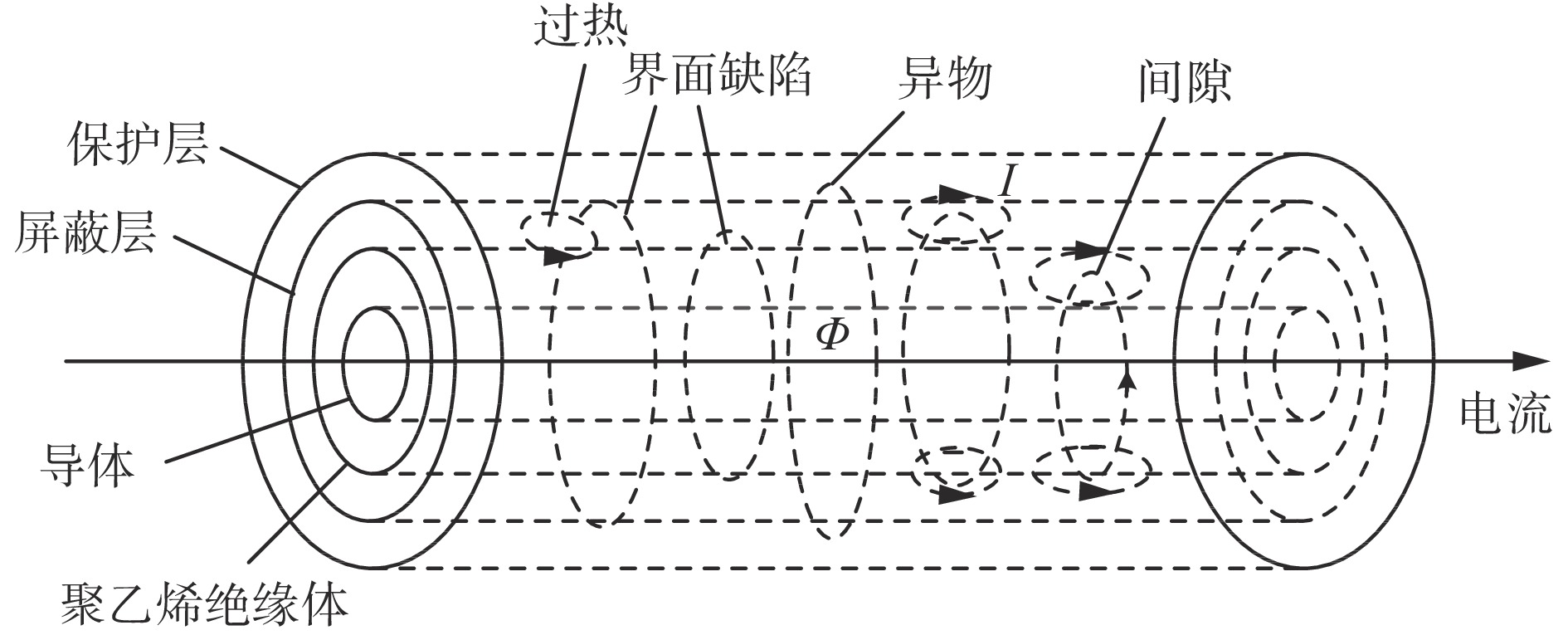
 下载:
下载:
